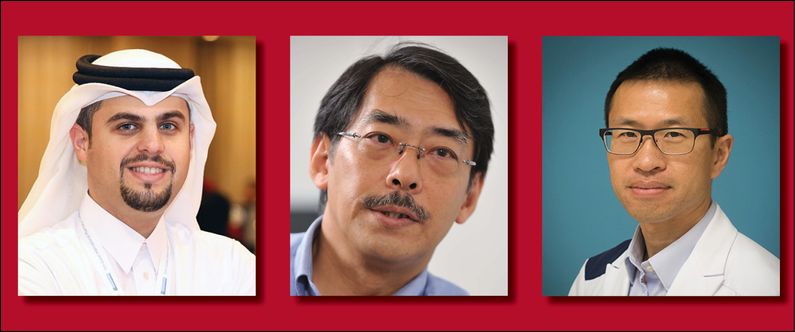Cancer therapies, Alzheimer’s and data sharing in pandemics discussed at WCM-Q Grand Rounds
 From left to right: Dr. Anas Hamad, Professor Takeshi Iwatsubo and Dr. Patrick Tang.
From left to right: Dr. Anas Hamad, Professor Takeshi Iwatsubo and Dr. Patrick Tang.
The safe use of anti-cancer therapies, the importance of sharing data during pandemics, and early treatment of Alzheimer’s disease were discussed by three expert speakers at Weill Cornell Medicine-Qatar’s (WCM-Q) Grand Rounds.
Dr. Anas Hamad, Director of Pharmacy at the National Center for Cancer Care & Research of Hamad Medical Corporation, discussed common causes of cancer-related medication errors and outlined effective error prevention strategies in his presentation.
Dr. Hamad, who also holds the position of Adjunct Assistant Professor in the College of Pharmacy at Qatar University, also explained the importance of multidisciplinary teams for safe and effective cancer treatment to the audience of physicians, nurses, dentists, pharmacists, allied health professionals, students, researchers and educators.
In a separate Grand Rounds session, Dr. Patrick Tang, Division Chief of Pathology Sciences at Sidra Medicine, gave a talk titled ‘Breaking the Cider House Rules: Tales from a Global Epidemic and Two Pandemics’. Dr. Tang, who also holds the position of associate professor of pathology and laboratory medicine at WCM-Q, demonstrated the importance of data and sample sharing during outbreaks, epidemics and pandemics, identified barriers that hinder the effective management of outbreaks, and discussed the roles of individuals in identifying and stopping outbreaks. His talk drew upon his observations of the 2002-2004 global SARS epidemic, the 2009-2010 swine flu epidemic and the current COVID-19 pandemic.
Dr. Tang said: “We have learned from these three examples that sharing of knowledge, information and samples is essential for outbreak management. We have also learned that we have to be flexible, to keep adapting our methods based on what we have learned, we have to be accepting of new ideas and new collaborations. Finally, we have to act swiftly and offer solutions, not barriers, which means we have to be prepared to use the best solution we have available rather than waiting for the perfect solution.”
A further Grand Rounds event featured Professor Takeshi Iwatsubo of the University of Tokyo discussing molecular neuropathy and very early treatment of Alzheimer’s disease. Prof. Iwatsubo explained the basic characteristics of neuropathy in Alzheimer’s disease and outlined current strategies to develop disease-modifying therapies for use in the very early stages of the condition.
All three lectures were accredited locally by the Ministry of Public Health’s Department of Healthcare Professions – Accreditation Section and internationally by the Accreditation Council for Continuing Medical Education (ACCME).